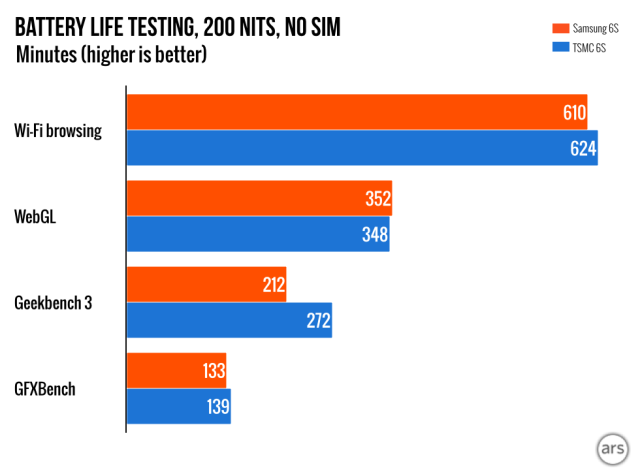New test results, released on Monday, support Apple’s assertion that there is little difference in battery life between an iPhone 6s powered by a Samsung A9 chip, and a device powered by an A9 fabricated by TSMC.

Ars Technica used two SIM-less iPhone 6s AT&T handsets, both set to the same level of display brightness. Tests showed that while TSMC’s chip performed marginally better in Wi-Fi Browsing and GFXBench tests, it actually performed a few points behind the Samsung chip in WebGL scores.
Geekbench 3 is where the TSMC chip shone, outperforming the Samsung silicon by 28%. Apple maintains Geekbench test are “unrealistic,” saying the benchmark forces a phone to operate at peak CPU usage until the device’s battery dies.
“So there are definitely circumstances under which the TSMC phone will last longer than the Samsung phone, but it’s not a universal problem. A Samsung chip that’s mostly idling or even one under modest CPU and GPU load, though, is going to behave in just about the same way as a TSMC chip. And the kinds of CPU-intensive work that the Samsung chip seems to struggle with just aren’t that common on smartphones. Most of the time, iPhone 6S battery life should be similar no matter which chip your phone is using.”
The site concluded that only under CPU-intensive tasks did Samsung’s A9 chip prove to be a detriment.
An Apple spokesperson told TechCrunch last week that the difference is small.
With the Apple-designed A9 chip in your iPhone 6s or iPhone 6s Plus, you are getting the most advanced smartphone chip in the world. Every chip we ship meets Apple’s highest standards for providing incredible performance and deliver great battery life, regardless of iPhone 6s capacity, color, or model.
Certain manufactured lab tests which run the processors with a continuous heavy workload until the battery depletes are not representative of real-world usage, since they spend an unrealistic amount of time at the highest CPU performance state. It’s a misleading way to measure real-world battery life. Our testing and customer data show the actual battery life of the iPhone 6s and iPhone 6s Plus, even taking into account variable component differences, vary within just 2-3% of each other.


